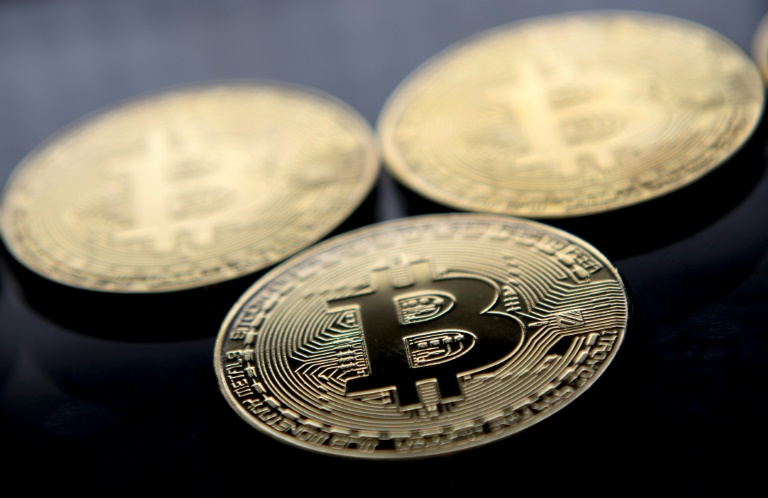
Bitcoin has enjoyed a stratospheric rise this year, approaching $10,000 from a 2017 low of $752 seen in January. Justin TALLIS – AFP
Bitcoin soared to fresh records Tuesday (Wednesday in Manila), putting it on course for $10,000, but the virtual currency’s stratospheric rise has fuelled fears of a bubble after a 10-fold increase this year.
The cryptocurrency, launched in 2009 as a bit of encrypted software written by someone using the Japanese-sounding name Satoshi Nakamoto, has had a roller-coaster ride that has taken it from just a few US cents to its current sky-high valuation.
Traded on specialist platform, with no legal exchange rate and no central bank backing it, Bitcoin is monitored and regulated by its community of users, and is used to buy everything from pizza to a pint in a London pub.
But it has attracted widespread criticism, from financial industry titans to governments.
JP Morgan Chase boss Jamie Dimon in September slammed the unit as a “fraud” and said he would fire his employees if they were caught trading it, while China has shut down Bitcoin trading platforms and South Korea’s prime minister Tuesday voiced fears it could lead the young to get involved in fraudulent crime.
Still, the opposition has not stopped a dizzying surge in bitcoin this year, with its value jumping a 2017 low of $752 in mid-January to a record high above $9,895 Tuesday afternoon. Its value has rise about 45 percent in the past two weeks alone.
Analysts say the popularity has been driven by growing interest from major investors and a decision last month by exchange giant CME Group to launch a futures marketplace for the currency, which has not been listed on a major bourse before.
Big gains, big risks
As its fortunes have improved, retail investors have also rushed to jump on to the Bitcoin bandwagon, although fears of a bubble are growing, having witnessed wild swings in the past.
“The biggest issue with Bitcoin is that with no government backing or regulation, the gains may be big—but the sell-offs can be equally as drastic,” warned James Hughes, chief market analyst of Britain-based forex trader AxiTrader, in a note to clients.
Transactions happen when heavily encrypted codes are passed across a computer network.
Bitcoin and other virtual currencies use blockchain, which records transactions that are updated in real time on an online ledger and which are maintained by a network of computers.
Hundreds of other digital currencies have been created since its launch, but Bitcoin remains by far the most popular.
Its supporters insist it offers an efficient alternative to traditional currencies because it is not subject to the whims of a state that may, for example, devalue its money to boost exports.
Commentators also suggest some are buying it as an alternative bet in times of global economic uncertainty.
But critics point to its volatility, an apparent vulnerability to theft and its use in illicit purchases online.
In one of the most high-profile scandals to hit the currency, major Tokyo-based bitcoin exchange MtGox collapsed in 2014 after admitting that 850,000 coins — worth around $480 million at the time—had disappeared from its vaults.
Bitcoin’s use on the underground Silk Road website, where users could use it to buy drugs and guns, was also presented as proof it was a bad thing.
Despite concerns, most observers believe it is unlikely to suffer heavy falls soon.
“There is no real catalyst on the horizon that is going to bring this down,” Shane Chanel, from ASR Wealth Advisers in Sydney, told AFP. KI
RELATED STORIES:
How cryptocurrencies like bitcoin work
Bitcoin house purchase earns man $1.3M profit